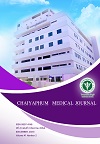Stress among Students in Online Classes during the COVID-19 Outbreak in a Secondary School, Mueang District, Chaiyaphum Province
Keywords:
stress, online classes, COVID-19Abstract
Background and Objective: The COVID-19 outbreak forced many schools to shift to an online mode of learning. Changing the learning system from face to face to an online learning has caused students to be stressed. The aims of this cross-sectional study were to determine the prevalence and factors associated with stress among students in online classes during the COVID-19 outbreak in a secondary school, Mueang district, Chaiyaphum province.
Methods: The sample consisted of all high school students who were selected by purposive sampling method. A self-reported questionnaire was utilized for collecting data during the period from January to February 2021. Data were analyzed by using descriptive statistic and multiple logistic regression. Adjusted odds ratio (AOR) and 95% confidence interval (95%CI) were presented.
Results: The results showed that there were 1,379 students in the study with a mean age of 14+1.4 years. The prevalence rate of stress was 18.7%. The factors associated with stress were female gender (AOR = 2.09, 95%CI: 1.55-2.81, p < 0.001), divorce or separation of parents (AOR = 1.80, 95%CI: = 1.34-2.41, p < 0.001), high workload on online classes (AOR = 2.26, 95%CI: 1.44-3.55, p < 0.001), difficulty in concentration on online classes (AOR = 1.51, 95%CI: 1.09-2.10, p = 0.013), online learning environment is not inherently motivation (AOR = 1.96, 95%CI: 1.44-2.68, p < 0.001), lack of interaction/communication with friends during online classes (AOR = 1.57, 95%CI: 1.15-2.15, p = 0.004), and low self-esteem (AOR = 1.44, 95%CI: 1.05-1.97, p = 0.021).
Conclusion: Based on this finding, the prevalence of stress among high school students is not high. However, a school had better prepared simple screening tool and support students to prevent stress before they cause severe mental health problems.
References
BBC ไทย. จากอนุบาล 1 ถึงอาชีวศึกษา วันแรกของการเรียนออนไลน์ในยุคโควิด- 19. [ออนไลน์]. [เข้าถึงเมื่อ 22 พฤษภาคม 2563]. จาก https://www.khaosod.co.th/bbc-thai/new4151848
ศูนย์ข่าวภาคใต้. ต้องเน้นเชิงรุก การศึกษาหลังยุคโควิด-19. [ออนไลน์]. [เข้าถึงเมื่อ 30 สิงหาคม 2563]. จาก https://mgonline.com/sounth/deail/9630000056121
สำนักงานศึกษาธิการภาค 2. ปัญหาการเรียนออนไลน์ในช่วงสถานการณ์การระบาดของโรคโควิด-19. [ออนไลน์]. [เข้าถึงเมื่อ 22 มีนาคม 2564]. จาก http://rep2.moe.go/th/home/index.php/site-administrator/2018-11-02-03-22-34/763-19-23-25563
AlAteeq DA, Aljhani S, AlEesa D. Perceived stress among students in virtual classrooms during the COVID-19 outbreak in KSA. J Taibah Univ Sci, 2020;15(5):398-403.
Jena PK. Online learning during lockdown period for Covid-19 in India. International Journal of Multidisciplinary Educational Research, 2020;9(8):82-92.
Livana PH, Mubin MF, Basthomi Y. ‘‘Learning task’’ Attributable to students’ stress during the pandemic Covid-19. Journal Ilmu Keperawatan Jiwa, 2020;3(2):203-8.
สถาบันวิจัยและบริการวิชาการ มหาวิทยาลัยอัสสัมชัญ. การเรียนออนไลน์ในสถานกาณ์ Covid-19. [ออนไลน์]. [เข้าถึงเมื่อ 26 มกราคม 2564]. จาก https://www.ryt9.com/s/abcp/3134816
Muilenburg LY, Berge ZL. Student barriers to online learning: a factor analytic study. Distance Educ, 2005;26(1):29-48.
โรงเรียนเมืองพญาแลวิทยา. ข้อมูลนักเรียน. [เอกสารอัดสำเนา]. ชัยภูมิ: โรงเรียน; 2563.
คลินิกวัยรุ่น โรงพยาบาลชัยภูมิ. ปัญหาความเครียดของนักเรียน. [เอกสารอัดสำเนา]. ชัยภูมิ: โรงพยาบาล; 2563.
อรวรรณ ศิลปะกิจ. แบบวัดความเครียดฉบับศรีธัญญา. วารสารสุขภาพจิตแห่งประเทศไทย, 2551;16(3):177-85.
สิรินิตย์ พรรณหาญ, บุญมี พันธุ์ไทย, กมลทิพย์ ศรีหาเศษ. ปัจจัยที่มีผลต่อความเครียดในการ เรียนของนักศึกษาแพทย์ชั้นปีที่ 4-6 คณะแพทยศาสตร์โรงพยาบาลรามาธิบดี มหาวิทยาลัยมหิดล. วารสารอิเล็กทรอนิกส์ Veridian มหาวิทยาลัยศิลปกร ฉบับมนุษย์ ศาสตร์ สังคมศาสตร์ และศิลปะศาสตร์, 2563;11(3):2579-93.
Muilenburg LY, Berge ZL. Student barriers to online learning: a factor analytic study. Distance Educ, 2005;26(1):29-48.
Abdulghani HM, Sattar K, Ahmad T, Akram A. Association of COVID-19 pandemic with undergraduate medical students’ perceived stress and coping. Psychol Res Behav Manag, 2020;13:871-81.
Goldstein JM, Jerram M, Poldrack R, Ahem T, Kennedy DN, Seidman LJ, et al. Hormonal cycle moduled arousal circuitry in Woman using functional magnetic resonance imaging. J Neurosci, 2005;25(40):9309-16.
Downloads
Published
Issue
Section
License
Copyright (c) 2021 Chaiyaphum Medical Journal : ชัยภูมิเวชสาร

This work is licensed under a Creative Commons Attribution-NonCommercial-NoDerivatives 4.0 International License.





